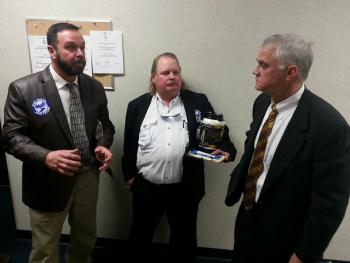Doug Busbee presents exemplary leadership and advocacy for our rivers...
Resident, DHEC square off on mega farms water withdrawals in SC (The State News, October 16, 2014) — Doug Busbee has spent nearly a year trying to keep mega farms from siphoning too much water from the Edisto River basin near his home.
Early Thursday, he drove from Aiken County to a scientific conference in Columbia and put government regulators on the spot before a ballroom filled with people.
On his mind was a 2010 law that lets industrial-scale farms siphon billions of gallons of water from rivers with little state oversight. Staring back at him were officials from the S.C. Department of Health and Environmental Control and the S.C. Department of Natural Resources, who had just spoken about the need to protect South Carolina’s waterways.
“When is your agency going to stand up to the politicians and say, ‘Hey, we’ve got a problem with this law and let’s suspend any future registrations or permits until this is addressed?” Busbee asked.
The answer appears to be never. DHEC won’t take a position on the law because that’s not the agency’s job, said David Wilson, the department’s water bureau chief. The Legislature passed the law in 2010 and Wilson indicated that any proposed changes would not come from his department.
Changing the law “cannot start in the agency,” Wilson said. “I’ll just be very clear with that. We implement the law as it is on the books. That law went through a very long process. There was a lot of stakeholder involvement. It was a four-year process.”
Thursday’s clash, which unfolded during a panel discussion at Clemson University’s annual water issues conference, was the latest in a dispute over whether to toughen South Carolina’s four-year-old water withdrawal law so that giant farms are treated like other large businesses.
Unlike industrial plants, industrial scale farms don’t need state permits to withdraw large amounts of water from rivers, and they don’t have to tell the public about their plans. And unlike industrial plants, agribusinesses only go through a token review based on a mathematical formula that doesn’t take into account times when rivers are low.
Powerful agricultural interests, including the S.C. Farm Bureau, oppose changing the law, arguing that farmers need the water to grow food the public depends on. But others say farms don’t need the special consideration – and excessive river withdrawals could deplete water levels downstream.
What was bothering Busbee and several neighbors with him Thursday was what they perceive as a lack of leadership by state agencies charged with protecting public health and the environment. While the Legislature would have to make changes to the law, DHEC and the DNR could help point out loopholes that allow big farms to take water with less oversight, Busbee said.
“Is it not up to you to say, ‘Hey lawmakers, this law does not make sense – this will cause a train wreck down the road?’” Busbee asked.
“I have no credentials to say that, but you do,” he told Wilson. “And you have the people and scientists within your departments that can say that.”
Ken Rentiers, a DNR official sitting next to Wilson, didn’t say anything before the panel’s moderator cut off any more discussion of the matter.
A Wagener businessman with a polite manner and easy smile, Busbee, 48, has led the grass-roots level charge to change the water withdrawal law, which environmentalists, farmers and businesses agreed to in 2010. After it passed, little was said about weaknesses in the law until last winter. That’s when a large potato farm opened without public notice and limited DHEC review.
The farm is along the South Fork of the Edisto River, a waterway that Busbee and many of his neighbors fish and canoe on. They initially worried that the farm would suck the river dry. That concern has been mollified as Walther Farms has attempted to work with citizens and limit its withdrawals.
But the farm’s quiet entry into South Carolina exposed weaknesses in the law that Sen. Wes Hayes addressed at the conference earlier this week. Hayes, R-York, said Wednesday that big farms could have a bigger impact on river levels than industrial plants and governments. He said the law needs looking at when the Legislature reconvenes next year.
Read more here: http://www.thestate.com/2014/10/16/3749989_resident-dhec-square-off-on-m...
